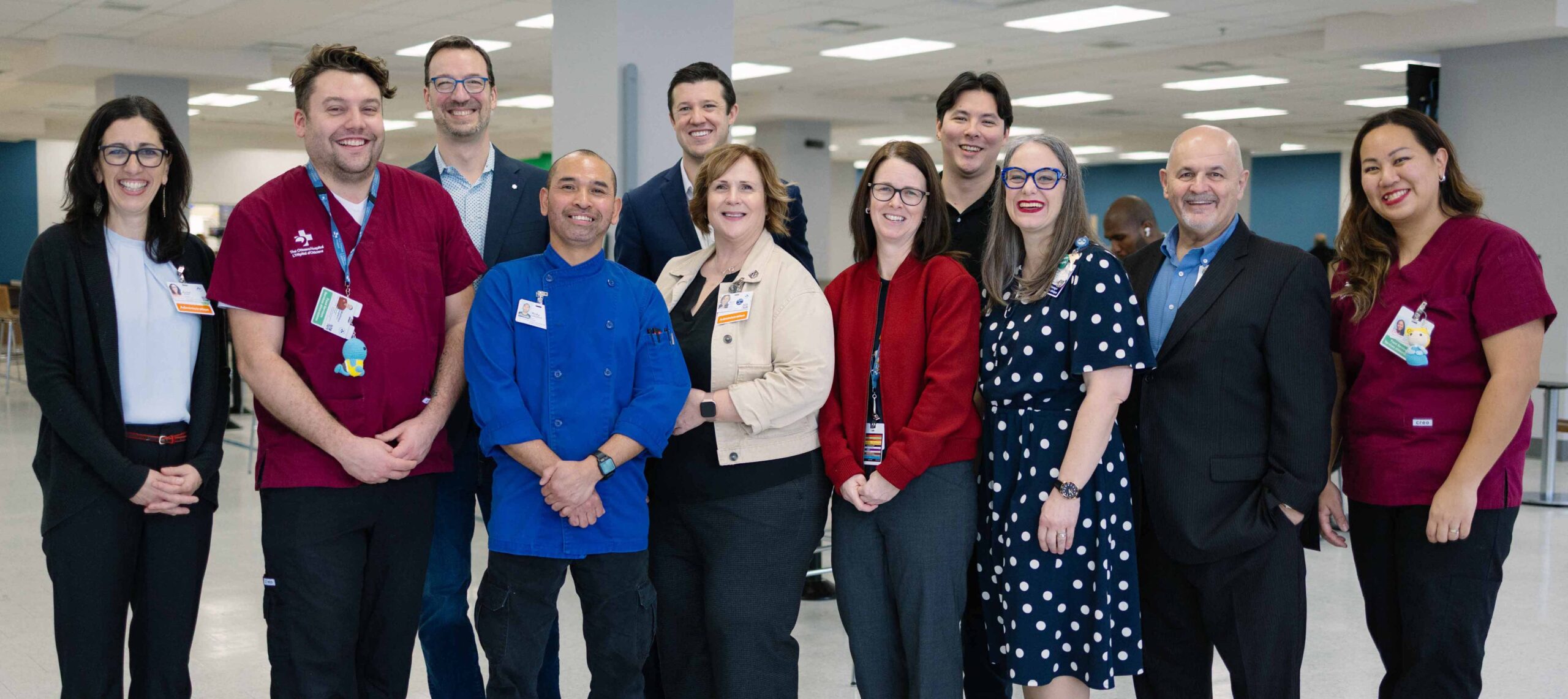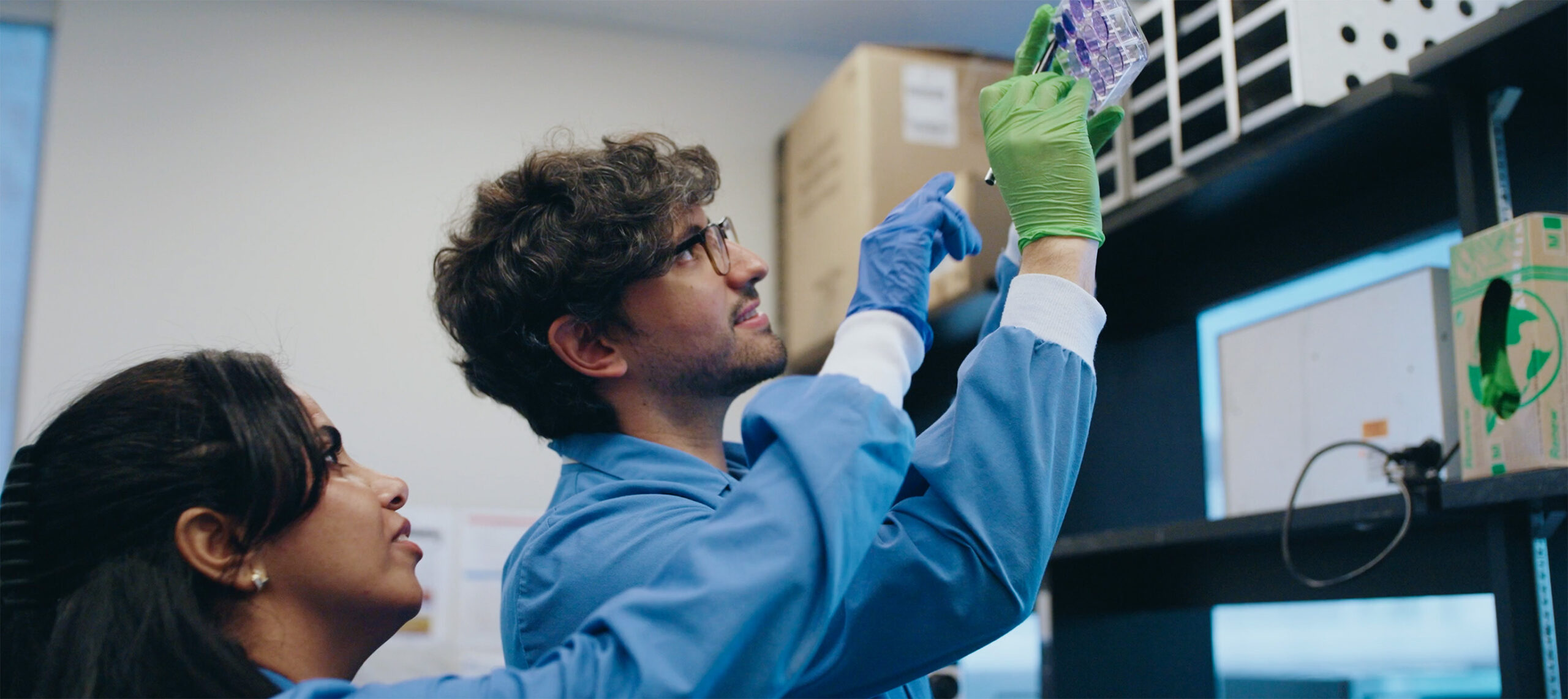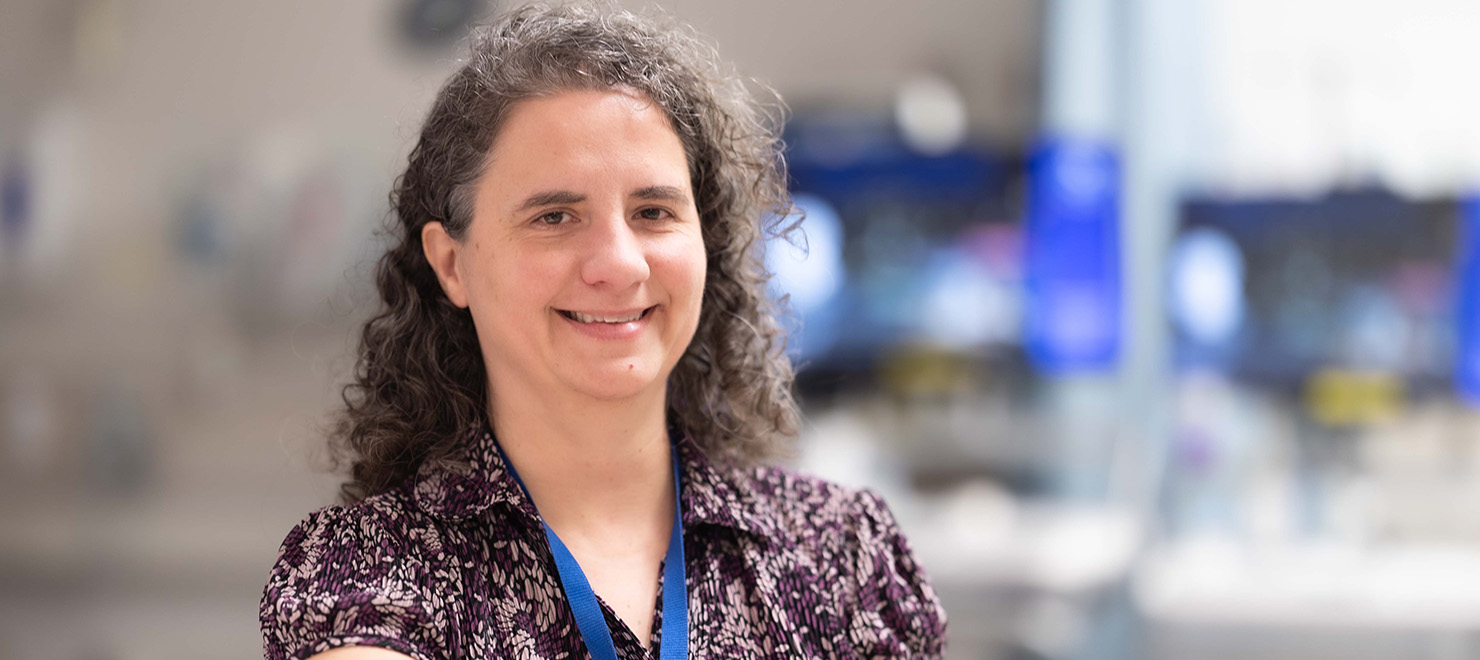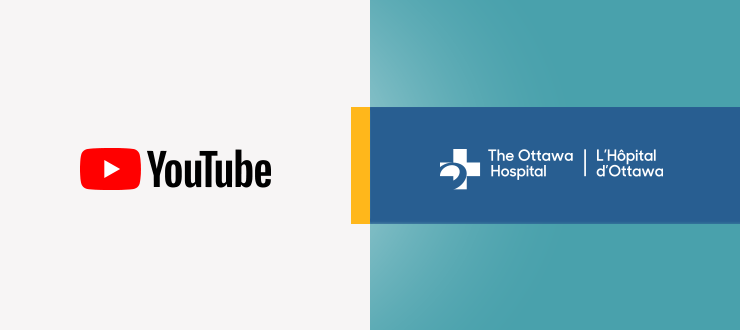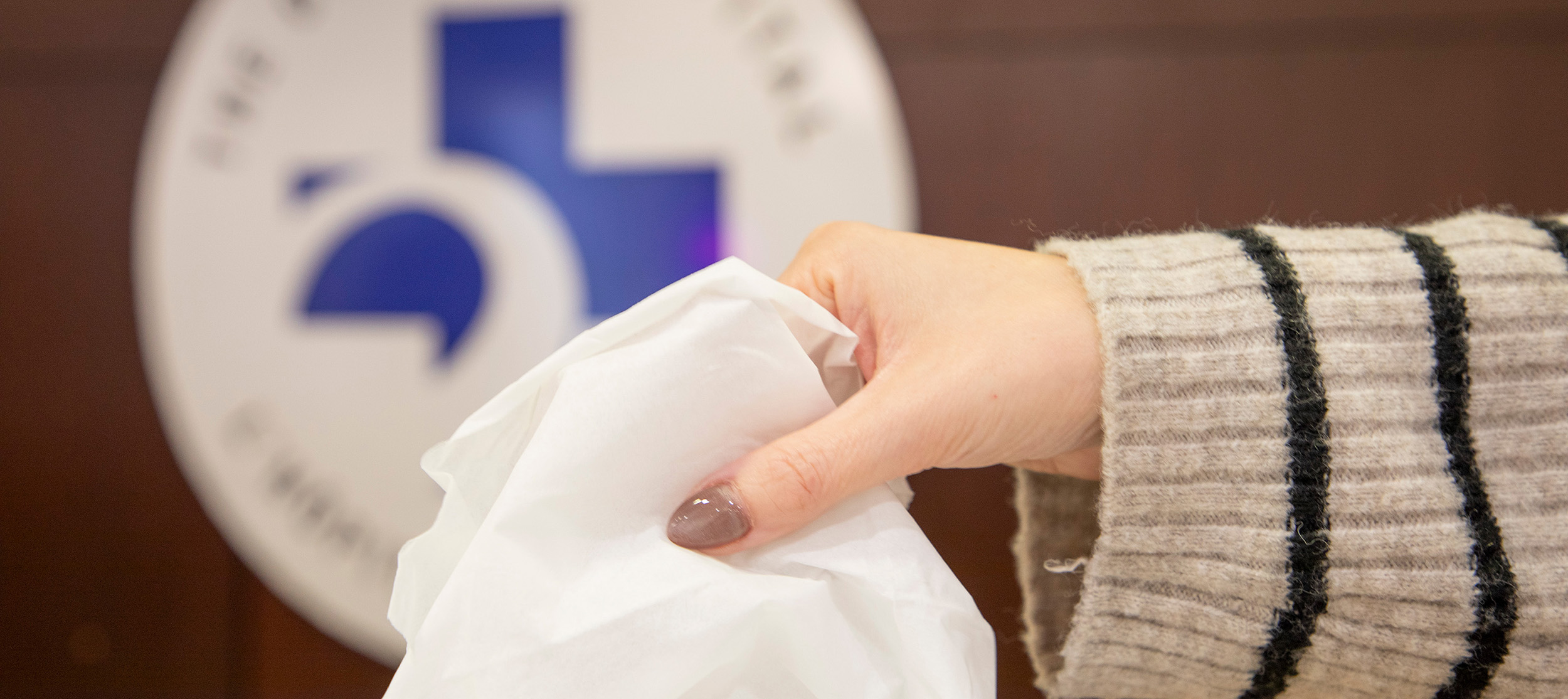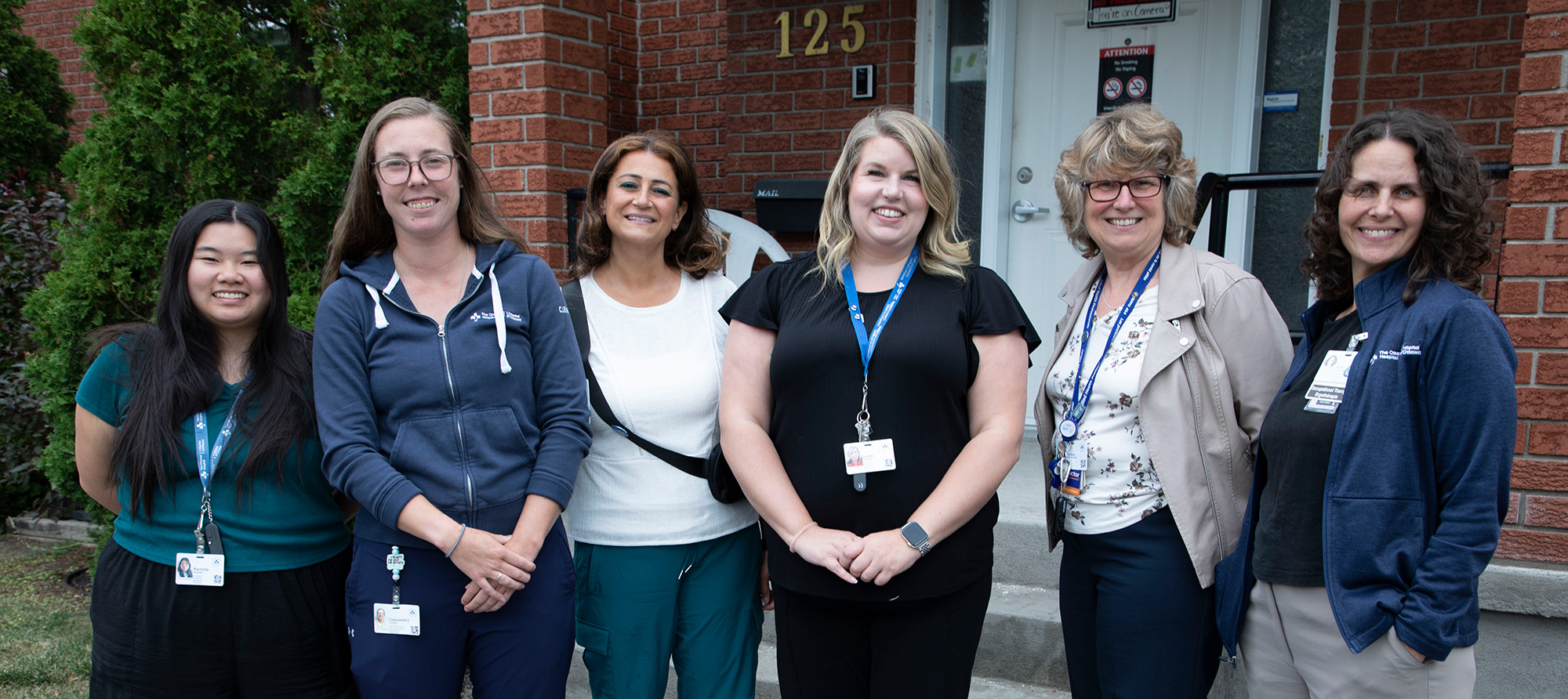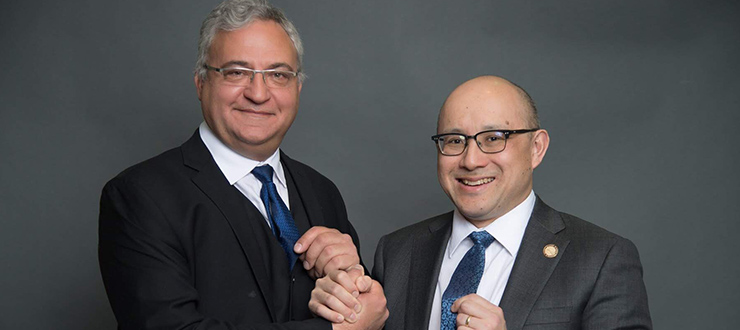
Dr. Robert Feibel (left) and Dr. Eugene Wai – both sporting their hospital-blue ties – are the medical leads for a Team Broken Earth mission going to Port-au-Prince, Haiti, to help people there in the long recovery from the 2010 earthquake.
They’re embarking on a mission to Haiti armed with donated medical supplies and equipment, skills to share, and the knowledge that they’ll face conditions they’ve never seen before, far outside their comfort zones. They hope to return with a deeper appreciation for clean water, and the knowledge they’ve helped heal broken bones and a broken country.
“We’ve been told that this experience makes us better caregivers back in Canada and makes us definitely thankful for what we do have,” said Dr. Eugene Wai, who is co-leading The Ottawa Hospital’s team along with fellow orthopaedic surgeon Dr. Robert Feibel. Both have done volunteer work before, but this international mission is their first.
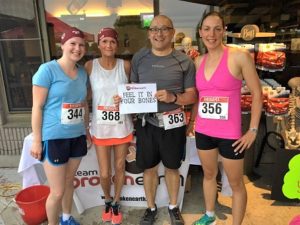
Health-care providers from The Ottawa Hospital raised funds to buy medical supplies for a mission to Haiti with Team Broken Earth from Jan. 16 to 23: (left to right) operating room RNs Katie Milcetic and Linda Schroeder, as well as orthopaedic surgeons Dr. Eugene Wai and Dr. Alexandra Stratton.
“When we go on these missions, we provide real tangible value to the local patients and medical staff,” said Dr. Wai. “But we also bring back a new sense of appreciation and perspective that hopefully makes us better doctors.”
Although many countries responded with help after the Jan. 12, 2010 earthquake in Haiti, not all that help was coordinated or sustainable, and the country continues to slowly rebuild. Hurricane Matthew hit in 2016 and another earthquake struck in October 2018.
“We have a social responsibility towards others on the planet, and the people of Haiti are at great disadvantage,” said Dr. Feibel. “At the present time, many people remain living in tents or makeshift housing that consist of sheets of metal or pieces of wood. There’s very little access to running water, no formal sewer system, no immunization program or very little.”
Fourteen people from The Ottawa Hospital are planning to go on the Jan. 16 to 23 mission as part of Team Broken Earth: Drs. Wai and Feibel; nurses Katie Milcetic, Linda Schroeder and Karen Gilroy; physiotherapists Martine Hadley and Eszter Villeneuve; occupational therapist Keri-Lynn Robinson; plastic surgeon Dr. Mary Jean Duncan; emergency physician Dr. Anita Pozgay; anesthesiologists Dr. Nikhil Rastogi and Dr. Leo Jeyaraj; anesthesia resident Alexander Poulton; and clinical research assistant Kim Vu. The team also includes nurses from the Children’s Hospital of Eastern Ontario and Kemptville District Hospital: Nicole Crowley, Tanya Deans, Amanda Chapman and Cheryl Millar.
Team Broken Earth is a non-profit group of volunteer medical professionals that carries out medical missions in low-income nations, where some people wait for months with broken bones and other life-changing injuries before seeing a doctor. It was formed in 2011 to respond to the 2010 earthquake in Haiti, and has since expanded into Bangladesh, Nicaragua and Guatemala.
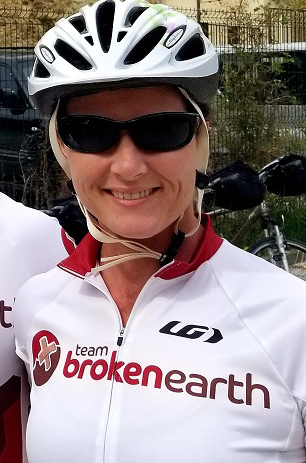
The Ottawa Hospital’s team has prepared for its Haiti mission with a lot of help from those who’ve gone before, including Tanya Deans, Manager of Clinical Services (Surgical Care Unit, Diagnostic Imaging, and Physiotherapy) at Kemptville District Hospital. “With her advice and guidance, we really have a good sense of what we will be facing,” said Dr. Robert Feibel. Dr. Darryl Young (Queensway Carleton Hospital) and Dr. Mark Steeves (Montfort Hospital) have also helped by “tutoring us, sending us lists of supplies needed in Haiti, and giving us patient care updates.”
“Team Broken Earth is committed to stay in Haiti until medical aid is no longer needed,” explained Vu, who will be offering logistical support. “So it’s not just flashes of aid; it’s long-term aid. It’s sustainable.”
The volunteers take their own vacation time to conduct clinics and surgeries and offer hands-on training for local medical staff. The Ottawa Hospital team has prepared for the mission by fundraising, so they can take medical supplies and equipment, and consulting with those who’ve gone before, especially about culture shock. Another Ottawa-area team went for a week in November 2018 and included Dr. Tonja Stothart and Dr. Mahmoud Almasri.
Dr. Feibel has been gathering medical equipment (donated or purchased with donated money) to ship to Haiti: dental chairs, a C-arm image intensifier (based on x-rays), and glucoscanners (to measure blood sugar). He’s also looking to start a bone transport program, which would allow surgeons to fill gaps of missing bone.
“I’m going specifically to see how this program can be implemented because just plating infected bone with poor-quality surrounding soft tissues is not the best standard of care,” Dr. Feibel said. “That’s what I’m hoping to achieve so we can have some continuity of care. There are now enough teams going that we can arrange for follow-ups for these patients having this type of complex reconstruction.”
When the team members care for one person, it also helps that person’s entire family.
“In Haiti, injured patients often languish without adequate care,” said Dr. Wai. “The family then becomes consumed in taking care of them. As a result, neither the patient nor the family can work or be productive to make ends meet or improve their lot. Often a simple surgery that we perform can get these patients back on their feet and to be active members in society again.”
Team members will also teach Haitian medical trainees and staff.
“Over the years, the teams going down have noticed a significant improvement in the quality of care provided by the Haitian staff due to the regularity of the teams going down,” said Dr. Wai.
Vu, who wants to become a doctor, said she’s mentally preparing to experience situations that don’t normally happen here.
“We take for granted a lot of treatments and resources here,” she said. “Over there, something minor can become life-changing. Patients lay in bed because they don’t have mobility aids like crutches or wheelchairs to help them move. We may see diseases we don’t commonly encounter here anymore, such as babies with hydrocephalus. Previous volunteers say it’s hard to just hold a baby instead of offering treatment…. It’s good for me to get out of my comfort zone and see what I can contribute and learn from these very resilient people.”


Support patient care and research at
The Ottawa Hospital
You might also like…
Reimagining hospital food: How The Ottawa Hospital is transforming the patient mealtime experience
In 2024, we launched the trial phase of our Patient Food Transformation Project. The goal was to see if it is possible to improve the overall nutrition and quality of food we serve to our patients, while increasing bedside hospitality, enhancing the overall sustainability of our food services, and not increasing operational costs. Our trial wrapped in 2025 with very promising results.
Everyone at our hospital plays a role in research. Here’s how
It’s Research Week at The Ottawa Hospital. Check out this video to hear from some of the incredible people fuelling our discoveries that are having an impact around the world.
Living with chronic pain? This online tool offers help — and hope
The Power Over Pain Portal is a free virtual resource hub designed to help empower youth and adults living with chronic pain through education and peer support.
What to do in an emergency: New first aid video series on YouTube
Would you know what to do if you saw someone experience a stroke, heart attack or opioid overdose? We’ve launched a series of easy-to-follow videos on YouTube that walk you through how to respond to common first aid emergencies.
Flu season 101: A quick guide to keeping the sniffles away
Got two minutes? This short guide could help you make it through flu season without stocking up on tissues.
How the Robin Easey Centre supports recovery after a brain injury
“When our clients have a purpose — even something as simple as a meaningful activity — it gives them new hope in life.” In this short Q&A, discover how the team at the Robin Easey Centre helps clients rebuild their daily routines and regain their independence after an acquired brain injury.


 To reset, hold the Ctrl key, then press 0.
To reset, hold the Ctrl key, then press 0.
